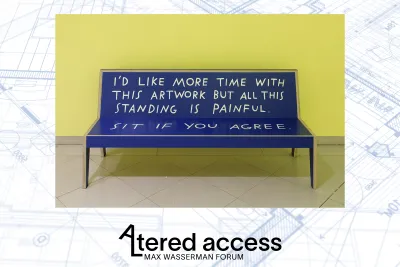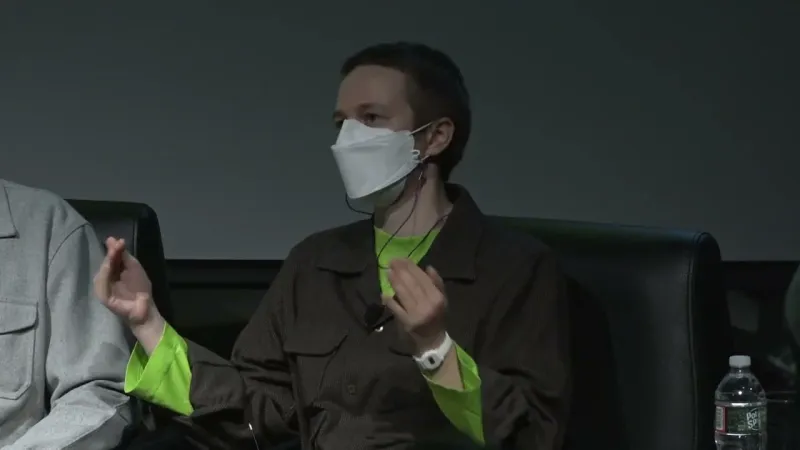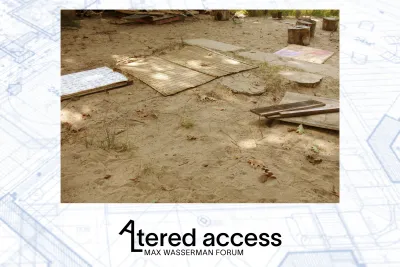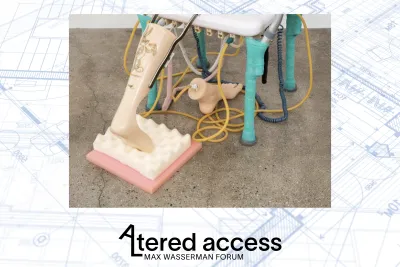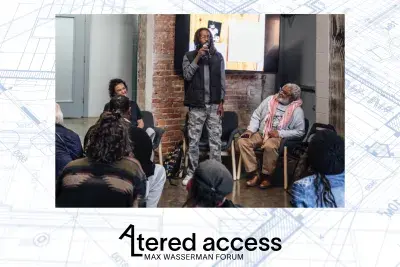Finnegan Shannon, Do you want us here or not (MMK) - Bench 3, 2021, MUSEUM MMK FÜR MODERNE KUNST, Acquired with generous support from the City of Frankfurt, photo: Axel Schneider
Altered Access Panel: To Build
To attend To Build virtually, please navigate to the livestream link by 10:00 AM on Saturday April 22.
Disability is both a rebuke and an invitation to the built world: a sharp critique of the inherited rigid shapes of buildings and streetscapes and a creative tradition of remaking those same structures.
What’s built is a product of human decision-making; it carries tacit ideas about normativity, dependence, and lives worth living. At the same time, disability culture has always been at the forefront of building and rebuilding, both in the margins and in the mainstream. This panel includes three creative practitioners whose work embodies speculative, friction-ful, playful, and critical dialogue with the built world. Contingency, surprise, reinvention, and estrangement light up their work, with the experimentation and multiplicity of art set against the rationalized, planned behemoth of the city. We’ll discuss the voice, vernacular, means and methods of their works, and mixing the languages of art, design, architecture, and planning.
Weblink to access livestream will be available the week of event.
About the Speakers
Noëmi Lakmaier
Noëmi Lakmaier is an Austrian-born live/performance artist living and working in East London. They have performed and exhibited widely in the UK and internationally. As a queer, disabled person and an immigrant to the UK, identity and how we relate to ourselves and others in the world, in an embodied way, are core interests in their site- and context-responsive practice. They are also an existential-phenomenological psychotherapist with a particular interest in the minority experience, gender, sexuality, disability, identity, intersectionality, and trauma.
Carmen Papalia
Born in 1981, Carmen Papalia is a nonvisual social practice artist with chronic and episodic pain. He uses organizing strategies and improvisation to address his access to public space, art institutions and visual culture. As a convener, he establishes welcoming spaces where disabled, sick and chronically ill people can build capacity for care that they lack on account of governmental failure and medical ableism. His work, which takes forms ranging from collaborative performance to public intervention, is a response to the harms of the Medical Model of Disability.
Papalia holds a Bachelor of Arts from Simon Fraser University and a Master of Fine Arts with a focus in Art & Social Practice from Portland State University.
He is an inaugural fellow of the Crip Tech Incubator via Leonardo: the International Society for the Arts, Sciences and Technology. In 2020 Papalia was one of 25 artists who received the Sobey Art Award; in 2019 he was a Sobey long list recipient in the West Coast / Yukon region. His work has been featured at institutions such as the Solomon R. Guggenheim Museum, the Whitney Museum of American Art, Tate Liverpool, Banff Centre for Arts & Creativity, the Contemporary Art Gallery, Surrey Art Gallery and Gallery Gachet.
Finnegan Shannon
Finnegan Shannon is an artist who experiments with forms of access that intervene in ableist structures with humor, earnestness, and rage. Some of their recent work includes Anti-Stairs Club Lounge, an ongoing project that gathers people together who share an aversion to stairs; Alt Text as Poetry, a collaboration with Bojana Coklyat that explores the expressive potential of image description; and Do You Want Us Here or Not, a series of benches and cushions designed for exhibition spaces. They have done projects with the Queens Museum, New York; the High Line, New York; Museum für Moderne Kunst, Frankfurt; MCA Denver; moCa Cleveland; and Nook Gallery, Oakland. Their work has been supported by a Wynn Newhouse Award, an Eyebeam fellowship, and grants from Art Matters Foundation and Canada Council for the Arts. They live and work in Brooklyn, New York.
Sara Hendren
Sara Hendren is a humanist in tech—an artist, design researcher, writer, and professor at Olin College of Engineering, Needham, Massachusetts. Her book, What Can a Body Do? How We Meet the Built World, explores the places where disability shows up in design at all scales: assistive technology, furniture, architecture, urban planning, and more. It was named one of the Best Books of 2020 by NPR and won the 2021 Science in Society Journalism book prize. Her art and design works have been exhibited in museums worldwide and are held in the permanent collections of the Museum of Modern Art, New York, and Cooper Hewitt, New York. In 2021 and 2022, she was Lecturer in Architecture at Harvard Graduate School of Design and a fellow in Education Policy at the New America think tank, where she was researching the future of work for adults with cognitive and developmental disabilities.
The Max Wasserman Forum
The Max Wasserman Forum on Contemporary Art was established in memory of Max Wasserman (MIT Class of 1935), a founding member of the Council for the Arts at MIT. This public forum was endowed through the generosity of the late Jeanne Wasserman and addresses critical issues in contemporary art and culture through the participation of renowned scholars, artists, and arts professionals. The Forum is organized and presented by the MIT List Visual Arts Center.
